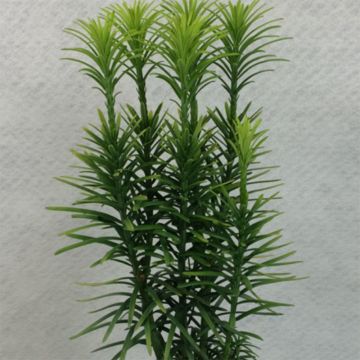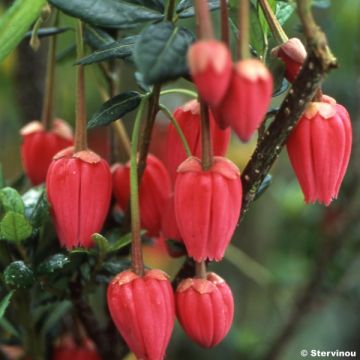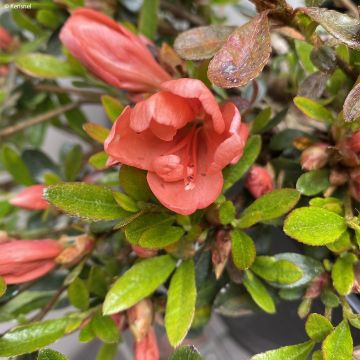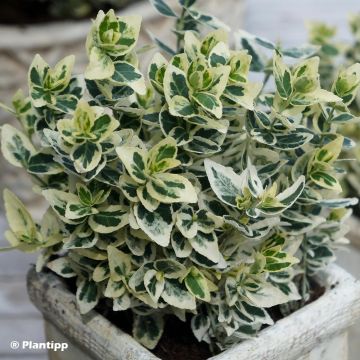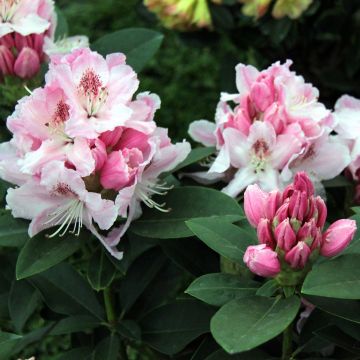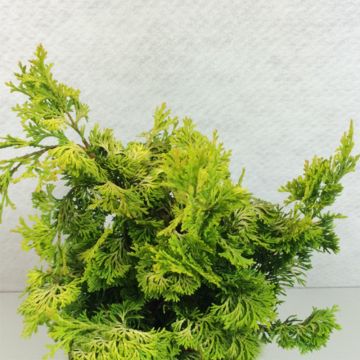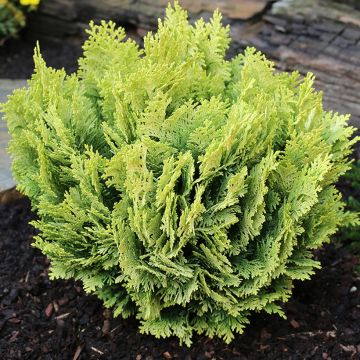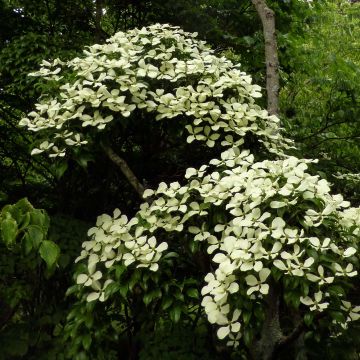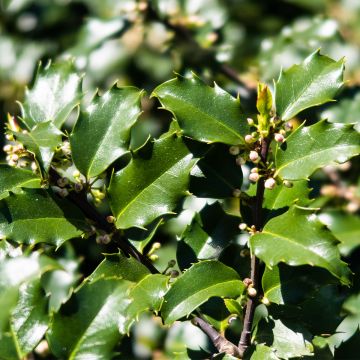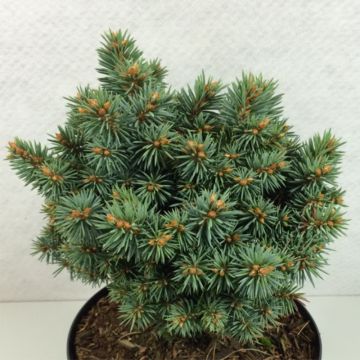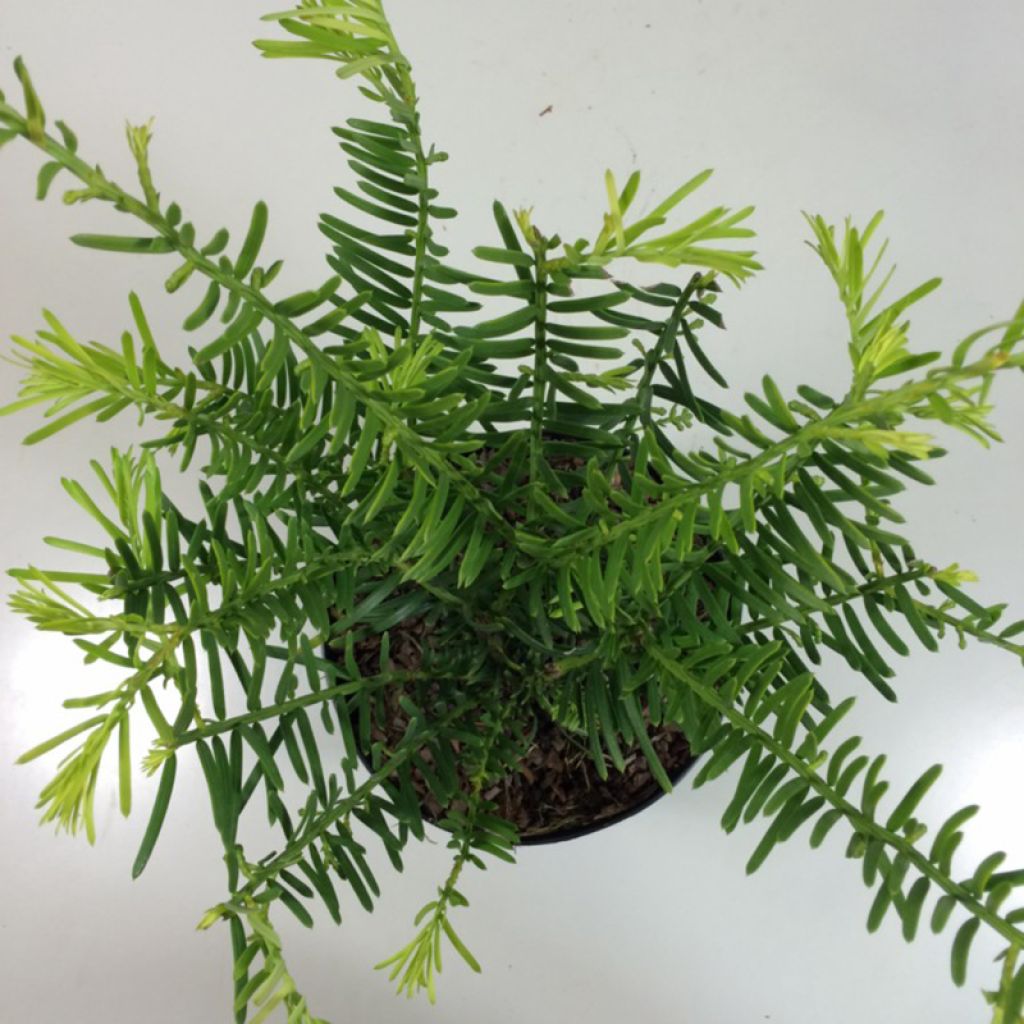

Cephalotaxus fortunei Prostrata - Pin chinois à queue de vache nain.
Cephalotaxus fortunei Prostrata
Cephalotaxus fortunei Prostrata
Fortune's Plum Yew, Chinese Plum Yew
This plant carries a 24 months recovery warranty
More information
We guarantee the quality of our plants for a full growing cycle, and will replace at our expense any plant that fails to recover under normal climatic and planting conditions.
From €5.90 for pickup delivery and €6.90 for home delivery
Express home delivery from €8.90.
Does this plant fit my garden?
Set up your Plantfit profile →
Description
Resembling a sprawling fern, Cephalotaxus fortunei 'Prostrata' or 'Protrate Spreader' is an evergreen conifer with a unique horizontal and prostrate habit. It produces flat branches with feathery dark green needles that gracefully spread and closely follow the contours of the ground. It is relatively hardy but prefers sheltered locations. Its growth is slow and thrives best in moist soil. This highly ornamental shrub, with its exotic fern-like appearance, is well-suited for shaded areas of the garden, in a large rockery or a cool understory.
Cephalotaxus fortunei, sometimes called Chinese Plum Yew or Prune Yew, is a conifer from the Cephalotaxaceae family native to central China and Japan. In its natural habitat, this species reaches a height of only 6 metres (20 feet) and a spread of 2 metres (7 feet), forming a spherical bush with pendulous and spreading branches.
The cultivar 'Prostrate Spreader', also known as 'Prostrata', is a dwarf form. It has a low and prostrate habit, forming a bush barely 90cm (35in) tall, but can eventually reach a spread of 4 to 4.50 metres (13 to 15 feet). It produces numerous basal branches covered with stiff, dark green, leathery needles that closely resemble those of yews (Taxus), but much longer; they measure about 10cm (4in). They are arranged spirally in two horizontal rows on either side of the branches, resembling large, slightly rigid feathers. Attractive fleshy fruits clustered in rounded bunches appear on the female plants in May-June. They resemble olives or small ovoid plums, and turn reddish-brown as they ripen in November. Caution: this fruiting is toxic. The male plants, on the other hand, produce small sacs filled with pollen in spring, also grouped in clusters. Over time, its bark becomes dark reddish-brown and peels off in scales.
The dwarf Fortune's plum yew is ideal for filling the ground in a large rockery, a slope, an understory or even a very shady and cool area. With its arborescent fern-like silhouette, it will add a touch of exoticism to the back of perennial borders, especially when planted in groups of 3. The graphic qualities of dwarf conifers naturally stand out in the design of a contemporary garden, which favours the aesthetics of shapes, silhouettes, and textures over that of flowering. These plants with strong personalities structurally enhance a border, mark pathways, border terraces, easily replacing the strong presence of trimmed boxwood. They provide a backdrop for small roses, peonies, or tousled grasses with complementary temperaments. They can also be combined with ground cover plants such as aubrietas, Cerastiums, and flowering shrubs. The key is to play with volumes and colours.
Report an error about the product description
Cephalotaxus fortunei Prostrata in pictures
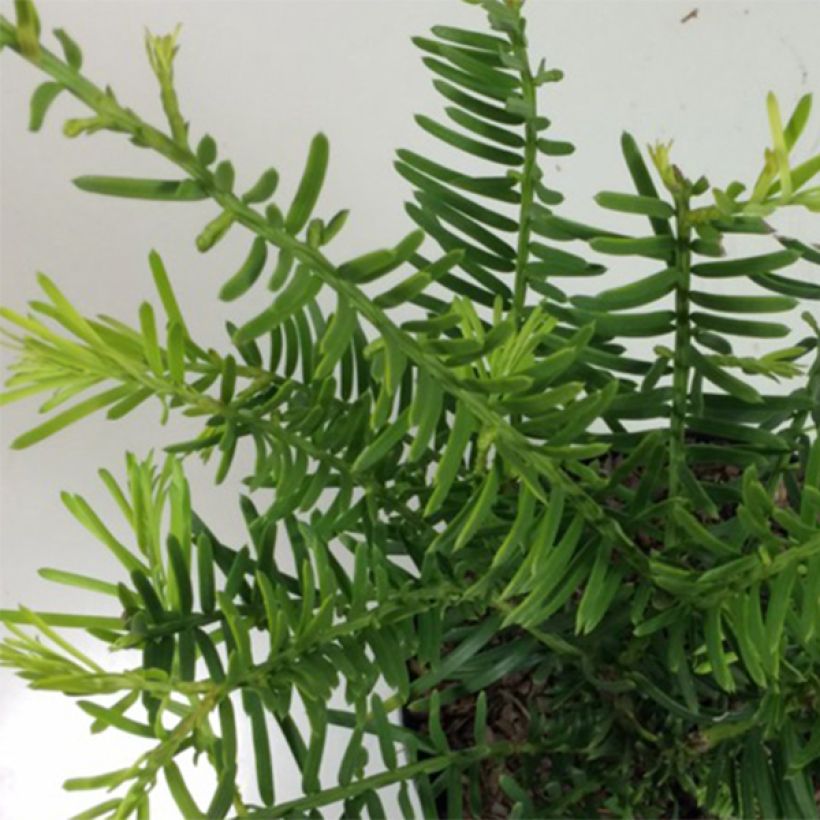

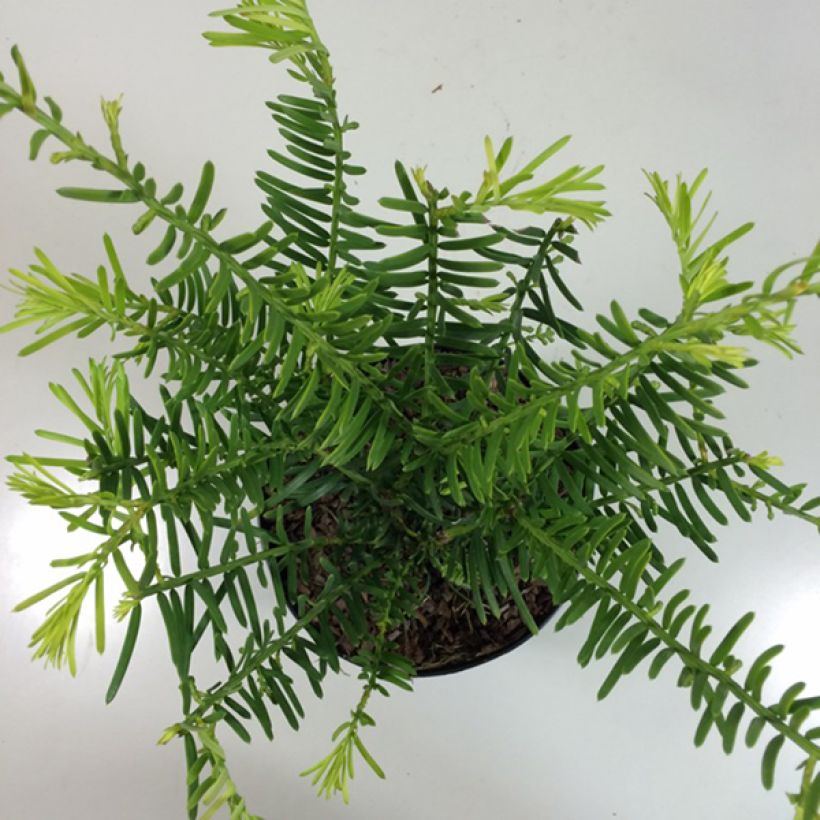

Plant habit
Flowering
Foliage
Safety measures
Botanical data
Cephalotaxus
fortunei
Prostrata
Cephalotaxaceae
Fortune's Plum Yew, Chinese Plum Yew
Cultivar or hybrid
atteinterespiratoire
Cette plante peut entraîner des symptômes allergiques.
Evitez de la planter si vous ou vos proches souffrez de rhinite saisonnière ("rhume des foins").
Davantage d'informations sur https://plantes-risque.info
Other Cephalotaxus
Planting and care
Cephalotaxus fortunei 'Prostrata' is planted in spring or autumn, in a soil that retains moisture, rich in humus, slightly acidic to neutral to slightly alkaline. This small conifer thrives in partial shade, and even in dense shade. Water the plants regularly in the months following planting. The dwarf plum yew is tolerant of soil type, which can be clayey or sandy, but it dislikes direct sunlight and dry periods. It is a shade or non-burning sun species, and prefers a cool, oceanic or montane climate. This bush does not require pruning, but you can remove any unsightly or obstructive branches to enhance its prostrate habit.
Planting period
Intended location
Care
This item has not been reviewed yet - be the first to leave a review about it.
Evergreen shrubs
Haven't found what you were looking for?
Hardiness is the lowest winter temperature a plant can endure without suffering serious damage or even dying. However, hardiness is affected by location (a sheltered area, such as a patio), protection (winter cover) and soil type (hardiness is improved by well-drained soil).

Photo Sharing Terms & Conditions
In order to encourage gardeners to interact and share their experiences, Promesse de fleurs offers various media enabling content to be uploaded onto its Site - in particular via the ‘Photo sharing’ module.
The User agrees to refrain from:
- Posting any content that is illegal, prejudicial, insulting, racist, inciteful to hatred, revisionist, contrary to public decency, that infringes on privacy or on the privacy rights of third parties, in particular the publicity rights of persons and goods, intellectual property rights, or the right to privacy.
- Submitting content on behalf of a third party;
- Impersonate the identity of a third party and/or publish any personal information about a third party;
In general, the User undertakes to refrain from any unethical behaviour.
All Content (in particular text, comments, files, images, photos, videos, creative works, etc.), which may be subject to property or intellectual property rights, image or other private rights, shall remain the property of the User, subject to the limited rights granted by the terms of the licence granted by Promesse de fleurs as stated below. Users are at liberty to publish or not to publish such Content on the Site, notably via the ‘Photo Sharing’ facility, and accept that this Content shall be made public and freely accessible, notably on the Internet.
Users further acknowledge, undertake to have ,and guarantee that they hold all necessary rights and permissions to publish such material on the Site, in particular with regard to the legislation in force pertaining to any privacy, property, intellectual property, image, or contractual rights, or rights of any other nature. By publishing such Content on the Site, Users acknowledge accepting full liability as publishers of the Content within the meaning of the law, and grant Promesse de fleurs, free of charge, an inclusive, worldwide licence for the said Content for the entire duration of its publication, including all reproduction, representation, up/downloading, displaying, performing, transmission, and storage rights.
Users also grant permission for their name to be linked to the Content and accept that this link may not always be made available.
By engaging in posting material, Users consent to their Content becoming automatically accessible on the Internet, in particular on other sites and/or blogs and/or web pages of the Promesse de fleurs site, including in particular social pages and the Promesse de fleurs catalogue.
Users may secure the removal of entrusted content free of charge by issuing a simple request via our contact form.
The flowering period indicated on our website applies to countries and regions located in USDA zone 8 (France, the United Kingdom, Ireland, the Netherlands, etc.)
It will vary according to where you live:
- In zones 9 to 10 (Italy, Spain, Greece, etc.), flowering will occur about 2 to 4 weeks earlier.
- In zones 6 to 7 (Germany, Poland, Slovenia, and lower mountainous regions), flowering will be delayed by 2 to 3 weeks.
- In zone 5 (Central Europe, Scandinavia), blooming will be delayed by 3 to 5 weeks.
In temperate climates, pruning of spring-flowering shrubs (forsythia, spireas, etc.) should be done just after flowering.
Pruning of summer-flowering shrubs (Indian Lilac, Perovskia, etc.) can be done in winter or spring.
In cold regions as well as with frost-sensitive plants, avoid pruning too early when severe frosts may still occur.
The planting period indicated on our website applies to countries and regions located in USDA zone 8 (France, United Kingdom, Ireland, Netherlands).
It will vary according to where you live:
- In Mediterranean zones (Marseille, Madrid, Milan, etc.), autumn and winter are the best planting periods.
- In continental zones (Strasbourg, Munich, Vienna, etc.), delay planting by 2 to 3 weeks in spring and bring it forward by 2 to 4 weeks in autumn.
- In mountainous regions (the Alps, Pyrenees, Carpathians, etc.), it is best to plant in late spring (May-June) or late summer (August-September).
The harvesting period indicated on our website applies to countries and regions in USDA zone 8 (France, England, Ireland, the Netherlands).
In colder areas (Scandinavia, Poland, Austria...) fruit and vegetable harvests are likely to be delayed by 3-4 weeks.
In warmer areas (Italy, Spain, Greece, etc.), harvesting will probably take place earlier, depending on weather conditions.
The sowing periods indicated on our website apply to countries and regions within USDA Zone 8 (France, UK, Ireland, Netherlands).
In colder areas (Scandinavia, Poland, Austria...), delay any outdoor sowing by 3-4 weeks, or sow under glass.
In warmer climes (Italy, Spain, Greece, etc.), bring outdoor sowing forward by a few weeks.

































